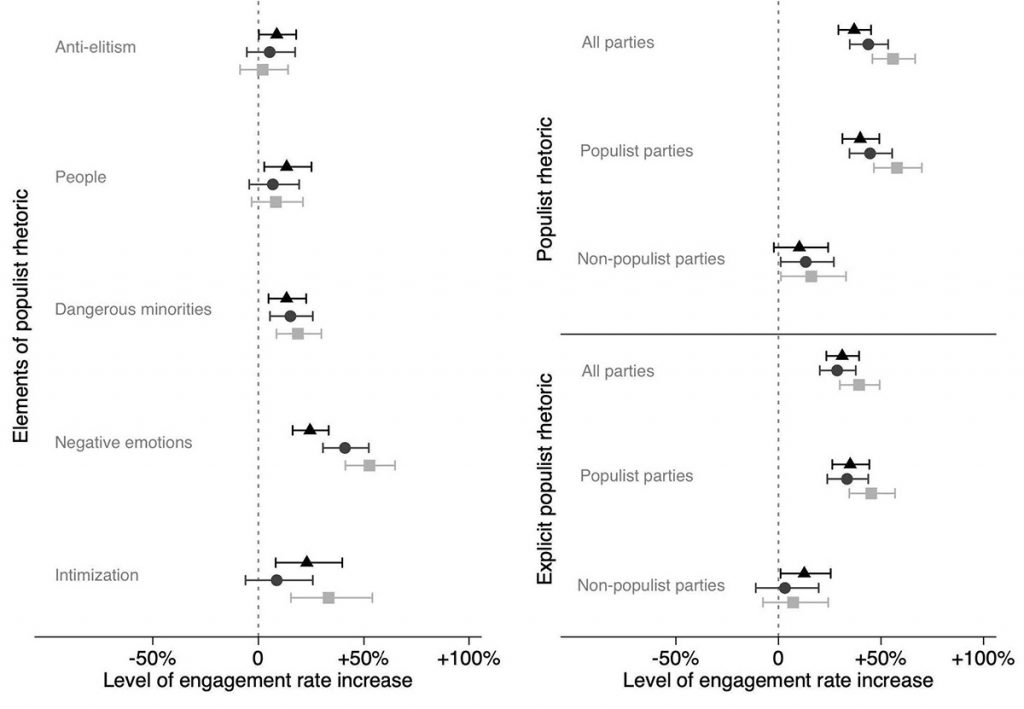Analysing posts on Facebook and Twitter-X, Andrea Ceron, Silvia Decadri, and Fedra Negri highlight how Italian politicians use populist rhetoric to generate engagement. They find that such rhetoric does indeed increase the likelihood of posts going viral, even among non-populist voters
There is strong compatibility between populist messaging and the modes of communication that social media platforms demand. This makes it a hugely promising environment for studying populist rhetoric. The opposition between corrupt elites and virtuous people — the core of the populist message — aligns well with the simplification, speed of expression, and polarisation that guide social media storytelling.
Social media platforms allow politicians to address sympathisers, voters, and journalists directly. They bypass, on the one hand, the institutional gatekeepers of their party affiliations and, on the other, traditional media. By removing intermediates, social media enables politicians to convey a less formal image of themselves, closer to the needs and concerns of the 'common people'.
The opposition between corrupt elites and virtuous people aligns well with the simplification, speed of expression, and polarisation that guide social media storytelling
Social media also allows parties and politicians to perform analysis without direct interaction between researchers and the individuals under investigation. This reduces the likelihood of people altering their behaviour in response to the awareness of being observed. Compared with other widely used data collection methods, such as surveys, social media analysis maximises the likelihood of observing genuine behaviours and interactions.
Using sentiment and dictionary analysis techniques, we analysed more than 390,000 posts published by over 700 Italian politicians on Twitter-X, from 1 January 2020 to 18 April 2022. Our analysis shows how politicians tend to adjust their communication style in response to contingent events. In particular, during moments of strong uncertainty and instability for the country, politicians increase their use of populist rhetoric and references to negative emotions.
During moments of strong uncertainty and instability, politicians increase their populist rhetoric
These two linguistic registers — populism and negative emotions — tend to be associated with each other. In times of crisis, politicians exploit the fears and frustrations of the electorate. They present a simplified view of the political landscape consisting of inadequate elites deserving of blame, and politicians 'of the people' on whom to rely. Although all Italian politicians use these linguistic registers, Lega, Movimento 5 Stelle (M5S), and Fratelli d’Italia (FdI) stood out during our period of analysis.
Topic modelling allows us to understand which particular issues Italian politicians care most about when they engage on Twitter-X. We observed a widespread tendency to prioritise catch-all topics, which are most likely to meet their followers' consensus. Among these are the valence themes and characteristics that all voters appreciate or dislike to the same extent, such as honesty versus corruption, and competence versus incompetence.
Politicians discuss complex and potentially divisive policy issues only if they have strong salience in current public discourse
Politicians discuss far less those policy issues which are more complex and potentially divisive, such as public education and energy transition. These issues find space on their social media agenda only if they are 'hot' — if they have strong salience in public discourse. Finally, politicians who use populist rhetoric most often are also more inclined to engage in discussions about topics with a strong emotional and value connotation. Such topics include supporting victims of violence and anti-elitism, or comments on popular culture such as sporting events and celebrity news.
Politicians' use of populist rhetoric on social media is widespread. But does this rhetoric capture users' attention and influence their voting intentions? To find out, we analysed Italian parties' electoral campaigns on Facebook during the 2019 European elections and the 2022 national elections.

We discovered that posts 'written in a populist manner' — that is, containing one or more of the elements of populist rhetoric listed on the vertical axis — generate more positive reactions (black triangle) — such as 'like', 'love', 'wow' — shares (black circle) and comments (grey square) than other posts. We see this positive effect of populist rhetoric on engagement, to varying degrees, for all parties. Followers of more populist parties like Lega, M5S, and FdI prove more receptive, yet followers of more conventional parties like the Partito Democratico are not immune to the charms of populist rhetoric.
Our results indicate that even followers of non-populist parties are more likely to like, comment and share posts that present at least one populist rhetoric element. This, of course, makes such posts more likely to go viral. Could supporters and voters of mainstream parties — even those who define themselves as 'anti-populist' — secretly harbour populist sentiment? Our research indicates that this may well be the case.
No.80 in a Loop thread on the Future of Populism. Look out for the 🔮 to read more